How Sony Cemented iPod's Supremacy
In the March 2004 article "Heir to Walkman's Throne," iPodlounge examined three companies - Sony, Microsoft, and Apple - and the products they have touted as successors to Sony's Walkman, or "iPod killers." We ended the article without reaching a conclusion as to which of the companies' products will actually replace the Walkman, though we did have some feelings on that subject at the time.
After three separate events last week, we now strongly believe that one company has effectively eliminated itself as a contender to the next-generation Walkman crown: Sony. Controversial though it may initially seem, we will explain our conclusion in light of the three bad moves Sony made over only several days time, including our hands-on experiences with the PlayStation Portable music, movie and game playing "Walkman of the Future," Sony's unexpected premiere of a completely separate "iPod killer," the hard disk-based VAIO Pocket, and finally, its disappointing launch of the Sony Connect music store.
PlayStation Portable
Los Angeles is not the first place you'd expect a Japanese electronics giant to unveil its newest product, but with generally friendly journalists already in town for the annual Electronic Entertainment Exposition (E3) show, Sony couldn't have picked a more receptive audience. And, in fact, it did pick its audience, restricting invitations to its downtown pre-E3 press conference, selectively denying advance requests from journalists to attend the event, and posting security screeners at its gates to turn away unwelcome attendees.
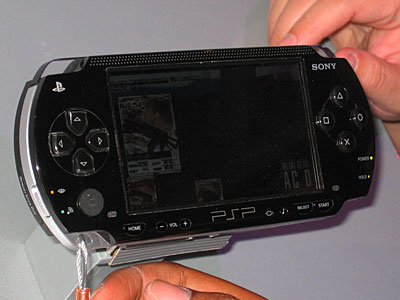
There was good reason for Sony to be concerned; skeptical journalists would have seen through the artifice it had planned. The debut of its PlayStation Portable (PSP) was to be a carefully stage-managed event, starting with the presentation of a supposedly working prototype of the device that appeared to be physically larger than the product Sony promised to deliver. Compounding the intrigue, Sony would never actually show the prototype playing a game; instead, it would only be used to show six or seven minutes worth of pre-recorded music video and movie trailer content. Finally, key developer Electronic Arts would present upcoming software on a large video screen - rather than on the prototype - and precede its showing with an unusually legalistic disclaimer: the audience would be watching a video capture from a PC emulating "early specifications that Sony released in their public statements about the PlayStation Portable."
The quote seemed to confirm what developers had been whispering for days if not weeks before the event: as of May 2004, Sony hadn't finished the device they were supposed to be manufacturing for a huge fourth-quarter 2004 Japanese launch, and no games were really ready, either. Only days earlier, The Wall Street Journal had reported that key game developer Square Enix - minority-owned by Sony - was "still not sure what Sony wants to do with [the PSP] - that's a problem[,]" and didn't know whether PSP would "be a game machine or a Video Walkman[.]" Consequently, Square Enix's contribution to the PSP press conference was merely footage from a straight-to-video movie it planned to release. As the United States release date of the PSP had already slipped to 2005, even members of Sony's hand-picked friendly audience began to wonder when and how the company actually intended to sell its new device. If PSP was to be the "Walkman of the Future," some began to suspect that the future wasn't about to start any time soon.
Many observers hoped that Sony would leak additional details on one of the three official days of the E3 show, but it didn't. A small, roped-off section of Sony's booth allowed people to stand in line to photograph or touch actual-sized prototype PSP shells, which were wired to display Evanescence music videos, the Spiderman 2 movie trailer, and pre-recorded game footage. Three kiosks, rumored to be PSP casings wired to PC emulation hardware, displayed modestly interactive game demonstrations. The Sony representative on the floor would not confirm whether the prototype PSPs were actually running the games they were showing, or whether they had working UMD discs inside. After extended probing, two noted journalists claimed that the only "real" prototype at the show was a larger-sized unit being carried in the jacket pocket of Sony COO and PlayStation creator Ken Kutaragi, a claim we could not independently verify.
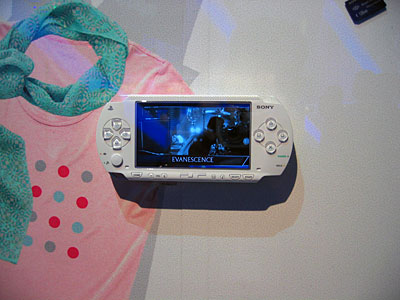
More importantly, Sony refused to disclose at E3 two critical facts regarding the new platform: its price and actual battery life. Though developers have been led to believe the PSP will launch at a price point between $249 and $299, one Sony executive previously went on record with a 48,000 yen price estimate - translating to approximately $420 U.S. or 350 Euros. Sony representatives at E3 would only say that the company was waiting to see what component prices looked like closer to the unit's release, and that the PSP's battery might range in performance "comparable to portable DVD players" at "two and a half hours," and music players at "approximately eight hours."
Finally, as we discovered at the show, the weakest link in the PSP's chain of Walkman appeal is its utility as a music player: you can't record on its discs, only on Memory Stick Duo Pro flash cards, which are sold separately. As of today, it's a foregone conclusion that any device based on pre-recorded discs or flash cards doesn't have a prayer of beating the iPod, and this is especially true if either medium is a proprietary new Sony format. (Recall Betamax, MiniDisc, and any number of other Sony format flops.) But those are the only media the PSP uses, so unless your favorite artist releases music on UMDs or you want to shell out for the expensive newest-generation Memory Sticks (512 Megabytes = $250 and up), the only music you'll hear on a PSP will be in the background of a game.
In sum, even if Sony's PlayStation Portable turns out to be a popular portable game console - which would itself be a historical anomaly given Nintendo's dominance with sub-$100 portable game hardware - we think that the chances of the device becoming the "Walkman of the Future" are close to zero. Unless there is a dramatic breakthrough in flash memory prices, the immediate future of portable audio entertainment is in hard disk-based solutions.
VAIO Pocket
In order to appreciate what we're about to describe, it's important to understand the corporate bureaucracy that is Sony, a Japanese corporation that includes several distinct subsidiaries, each a separate fiefdom with unique assets and a prince-like leader. Though all of the subsidiaries are overseen by Sony's CEO Nobuyuki Idei, who was incidentally named one of the world's worst corporate managers by Business Week magazine last year, each subsidiary operates more or less independently, developing products that compete with other Sony offerings almost as frequently as those from other companies.
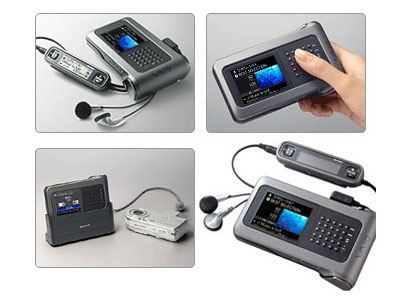
Sony's internal conflicts manifested most dramatically last week when two of its subsidiaries unveiled products that arguably contradict each other: in the Western hemisphere, a U.S.-based Sony executive was unveiling the "Walkman of the Future," PlayStation Portable, only one day after his Japan-based counterparts had debuted the "iPod killer" VAIO Pocket, a hard disk-based handheld jukebox with a color screen. Assuming that the devices came out at roughly the same time - as they might if Sony intended to stick to its announced release dates - they would be competing iPod alternatives, each based on different technologies, media formats, and marketing schemes, yet both from the same company.
Clearly, the VAIO Pocket is Sony's most desperate attempt to clone the iPod: it acknowledges the strength of Apple's packaging by trying to be stylish, the simplicity of the iPod's large touch wheel interface by using an odd square of touch-sensitive nubs called "G-Sense," and the power of Apple's chosen storage medium by including a hard disk.
More interestingly, the VAIO Pocket avoids all of Sony's prior music and portable brand names, including Walkman, Network Walkman, and CLIE, instead relying on the branding of the company's personal computer line. And it adds two features the iPod lacks: extended (20 hour) battery life and a color screen. The color screen can be used to display digital photos, but apparently not movies or other video content.
But in addition to being physically larger than the iPod - an issue that has dogged other iPod competitors - the VAIO Pocket, like the PlayStation Portable, has two critical Achilles' Heels: the first is Sony's proprietary standards. As is the case with Sony's other digital music devices, the VAIO Pocket requires users to convert their songs into the proprietary Sony ATRAC audio format, which takes more time and hassle than transferring MP3s straight onto an iPod. Notably, users of other Sony devices have previously complained loudly about the poor performance and stability of Sony's ATRAC conversion and uploading software.
The second problem is a high price: at 53,000 yen (currently $468 U.S. or 390 Euros), the 20GB VAIO Pocket will cost about as much as a 40GB iPod, itself currently a low seller relative to Apple's more popular mini, 15GB and 20GB iPods. Given that consumers have complained about the iPod's price, the prospects for a product that is relatively more expensive, larger, and requires ATRAC conversion software are very weak.
The Final Nail in the Coffin: Sony Connect
It would have been a bad enough week for Sony if the company had only shown two products that were unlikely to knock the iPod off its perch, but on May 7, the company launched Sony Connect, a competitor to Apple's iTunes Music Store. Relying on a digital jukebox program called SonicStage, which pales in comparison with the sophisticated iTunes, Sony Connect cloned parts of Apple's pay-per-download music strategy, but poorly.
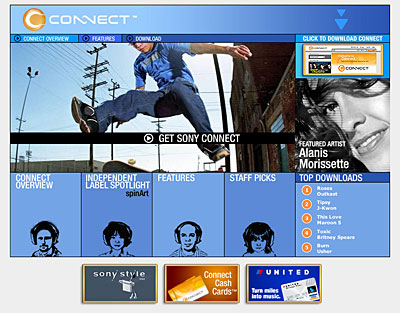
Within days of its debut, Sony Connect had been roundly criticized from all corners, including deep complaints from The New York Times ("almost embarrassingly crude," "maybe they ought to call it Sony Disconnect"), USA Today ("a flop," "poorly designed," "confusing"), and others. Not only did users and critics complain about the software and Sony's music library, but prices earned scorn as well: Sony decided to ask double their standard charge for tracks longer than seven minutes in length, a perceived "price creeping" violation of Apple's consistent and popular 99 cent per track philosophy.
Sony Connect's biggest limitation: like Sony's audio devices, it only uses songs in ATRAC format, which renders the service next to useless for both iPod users and those with WMA-based audio players. And its biggest "uh oh" for the future? Sony has touted Sony Connect as its centerpiece for selling music, and potentially downloadable games, for both the PlayStation Portable and VAIO Pocket devices. That's only a good thing if you can accept the fact that you can't easily convert anything you bought from iTunes, Napster, or other paid services and use it with Sony's products.
Historically, Sony's record with personal computer software has been terrible: application bugs, refusal to update drivers for anything other than recently-released computers, and other issues have plagued Sony's PC development efforts. As a result, we remain skeptical of their ability to fix the problems with Sony Connect any time in the near future - and certainly even more skeptical that the company will catch up with iTunes or the iTunes Music Store.
Concluding Thoughts
Stepping briefly out from the curtain to offer a personal opinion as the primary author of this piece, I would like to add the following: after roughly a dozen years writing about electronic entertainment products, I've seen plenty of interesting new technologies - enough to know the difference between likely hits and certain misses. Last year, I was one of the first writers to publish a print article tearing apart 2003's false prophet of consumer electronics, Nokia's $299 N-Gage, which tantalized some writers and analysts by blending MP3 and game playing features with a cellular phone. Nokia's size and large advertising budget encouraged less than critical early journalism on the platform, and it was only after the N-Gage crashed spectacularly on launch that supposedly informed critics were willing to publicly condemn it.
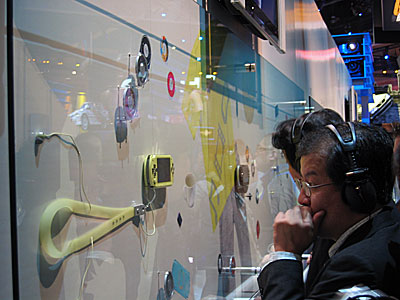
Given the tricks Sony appears to be pulling with the PlayStation Portable, from manipulating journalists to refusing to disclose key launch details, as well as the mistakes it has made with its ATRAC format, its consistently high pricing, and the near-universal condemnation of the only legal download service available for its platforms, I and we at iPodlounge feel quite strongly that Sony is too organizationally confused to mount an effective challenge to the iPod juggernaut. Even if we are wrong, and the company releases the PSP for $199, we think that its proprietary media formats and likely release date will cripple its appeal as an iPod-competitive audio device. At best, it will be the Gameboy of the Future, and nothing more. Similarly, even if the VAIO Pocket was cheaper and offered direct MP3 playback support, Apple's lead with the iPod now is so large that Sony would be hard pressed to match it.
Some may prefer to dismiss our conclusions, especially in light of the otherwise under-critical press the PSP and VAIO Pocket have previously received, and particularly given that iPodlounge is, after all, an iPod-specific site. Bear in mind, however, that we continue to keep an eye on all emerging technologies, and have previously complimented iPod competitors when they have bested Apple on features or pricing. Our feelings about Sony's PSP, VAIO Pocket, and Sony Connect should therefore be understood for what they are: critical, but reached after hands-on testing and serious consideration.
When Sony first disclosed the concept for the PlayStation Portable last year and called it the "Walkman of the Future," it was clearly jabbing at Apple's global success with the iPod. But after using and learning more about the PSP last week, we're now convinced that Apple, not Sony, has already landed the knock-out punch in the Walkman wars. Only time will tell whether Sony will keep trying for a rematch, or take the wiser road and join forces with a clear winner. The sooner it abandons its obsession with proprietary encryption and storage mediums, the sooner consumers will return en masse to its products. In the meanwhile, the digital music revolution definitely won't be waiting around for Sony.
After three separate events last week, we now strongly believe that one company has effectively eliminated itself as a contender to the next-generation Walkman crown: Sony. Controversial though it may initially seem, we will explain our conclusion in light of the three bad moves Sony made over only several days time, including our hands-on experiences with the PlayStation Portable music, movie and game playing "Walkman of the Future," Sony's unexpected premiere of a completely separate "iPod killer," the hard disk-based VAIO Pocket, and finally, its disappointing launch of the Sony Connect music store.
PlayStation Portable
Los Angeles is not the first place you'd expect a Japanese electronics giant to unveil its newest product, but with generally friendly journalists already in town for the annual Electronic Entertainment Exposition (E3) show, Sony couldn't have picked a more receptive audience. And, in fact, it did pick its audience, restricting invitations to its downtown pre-E3 press conference, selectively denying advance requests from journalists to attend the event, and posting security screeners at its gates to turn away unwelcome attendees.

There was good reason for Sony to be concerned; skeptical journalists would have seen through the artifice it had planned. The debut of its PlayStation Portable (PSP) was to be a carefully stage-managed event, starting with the presentation of a supposedly working prototype of the device that appeared to be physically larger than the product Sony promised to deliver. Compounding the intrigue, Sony would never actually show the prototype playing a game; instead, it would only be used to show six or seven minutes worth of pre-recorded music video and movie trailer content. Finally, key developer Electronic Arts would present upcoming software on a large video screen - rather than on the prototype - and precede its showing with an unusually legalistic disclaimer: the audience would be watching a video capture from a PC emulating "early specifications that Sony released in their public statements about the PlayStation Portable."
The quote seemed to confirm what developers had been whispering for days if not weeks before the event: as of May 2004, Sony hadn't finished the device they were supposed to be manufacturing for a huge fourth-quarter 2004 Japanese launch, and no games were really ready, either. Only days earlier, The Wall Street Journal had reported that key game developer Square Enix - minority-owned by Sony - was "still not sure what Sony wants to do with [the PSP] - that's a problem[,]" and didn't know whether PSP would "be a game machine or a Video Walkman[.]" Consequently, Square Enix's contribution to the PSP press conference was merely footage from a straight-to-video movie it planned to release. As the United States release date of the PSP had already slipped to 2005, even members of Sony's hand-picked friendly audience began to wonder when and how the company actually intended to sell its new device. If PSP was to be the "Walkman of the Future," some began to suspect that the future wasn't about to start any time soon.
Many observers hoped that Sony would leak additional details on one of the three official days of the E3 show, but it didn't. A small, roped-off section of Sony's booth allowed people to stand in line to photograph or touch actual-sized prototype PSP shells, which were wired to display Evanescence music videos, the Spiderman 2 movie trailer, and pre-recorded game footage. Three kiosks, rumored to be PSP casings wired to PC emulation hardware, displayed modestly interactive game demonstrations. The Sony representative on the floor would not confirm whether the prototype PSPs were actually running the games they were showing, or whether they had working UMD discs inside. After extended probing, two noted journalists claimed that the only "real" prototype at the show was a larger-sized unit being carried in the jacket pocket of Sony COO and PlayStation creator Ken Kutaragi, a claim we could not independently verify.

More importantly, Sony refused to disclose at E3 two critical facts regarding the new platform: its price and actual battery life. Though developers have been led to believe the PSP will launch at a price point between $249 and $299, one Sony executive previously went on record with a 48,000 yen price estimate - translating to approximately $420 U.S. or 350 Euros. Sony representatives at E3 would only say that the company was waiting to see what component prices looked like closer to the unit's release, and that the PSP's battery might range in performance "comparable to portable DVD players" at "two and a half hours," and music players at "approximately eight hours."
Finally, as we discovered at the show, the weakest link in the PSP's chain of Walkman appeal is its utility as a music player: you can't record on its discs, only on Memory Stick Duo Pro flash cards, which are sold separately. As of today, it's a foregone conclusion that any device based on pre-recorded discs or flash cards doesn't have a prayer of beating the iPod, and this is especially true if either medium is a proprietary new Sony format. (Recall Betamax, MiniDisc, and any number of other Sony format flops.) But those are the only media the PSP uses, so unless your favorite artist releases music on UMDs or you want to shell out for the expensive newest-generation Memory Sticks (512 Megabytes = $250 and up), the only music you'll hear on a PSP will be in the background of a game.
In sum, even if Sony's PlayStation Portable turns out to be a popular portable game console - which would itself be a historical anomaly given Nintendo's dominance with sub-$100 portable game hardware - we think that the chances of the device becoming the "Walkman of the Future" are close to zero. Unless there is a dramatic breakthrough in flash memory prices, the immediate future of portable audio entertainment is in hard disk-based solutions.
VAIO Pocket
In order to appreciate what we're about to describe, it's important to understand the corporate bureaucracy that is Sony, a Japanese corporation that includes several distinct subsidiaries, each a separate fiefdom with unique assets and a prince-like leader. Though all of the subsidiaries are overseen by Sony's CEO Nobuyuki Idei, who was incidentally named one of the world's worst corporate managers by Business Week magazine last year, each subsidiary operates more or less independently, developing products that compete with other Sony offerings almost as frequently as those from other companies.

Sony's internal conflicts manifested most dramatically last week when two of its subsidiaries unveiled products that arguably contradict each other: in the Western hemisphere, a U.S.-based Sony executive was unveiling the "Walkman of the Future," PlayStation Portable, only one day after his Japan-based counterparts had debuted the "iPod killer" VAIO Pocket, a hard disk-based handheld jukebox with a color screen. Assuming that the devices came out at roughly the same time - as they might if Sony intended to stick to its announced release dates - they would be competing iPod alternatives, each based on different technologies, media formats, and marketing schemes, yet both from the same company.
Clearly, the VAIO Pocket is Sony's most desperate attempt to clone the iPod: it acknowledges the strength of Apple's packaging by trying to be stylish, the simplicity of the iPod's large touch wheel interface by using an odd square of touch-sensitive nubs called "G-Sense," and the power of Apple's chosen storage medium by including a hard disk.
More interestingly, the VAIO Pocket avoids all of Sony's prior music and portable brand names, including Walkman, Network Walkman, and CLIE, instead relying on the branding of the company's personal computer line. And it adds two features the iPod lacks: extended (20 hour) battery life and a color screen. The color screen can be used to display digital photos, but apparently not movies or other video content.
But in addition to being physically larger than the iPod - an issue that has dogged other iPod competitors - the VAIO Pocket, like the PlayStation Portable, has two critical Achilles' Heels: the first is Sony's proprietary standards. As is the case with Sony's other digital music devices, the VAIO Pocket requires users to convert their songs into the proprietary Sony ATRAC audio format, which takes more time and hassle than transferring MP3s straight onto an iPod. Notably, users of other Sony devices have previously complained loudly about the poor performance and stability of Sony's ATRAC conversion and uploading software.
The second problem is a high price: at 53,000 yen (currently $468 U.S. or 390 Euros), the 20GB VAIO Pocket will cost about as much as a 40GB iPod, itself currently a low seller relative to Apple's more popular mini, 15GB and 20GB iPods. Given that consumers have complained about the iPod's price, the prospects for a product that is relatively more expensive, larger, and requires ATRAC conversion software are very weak.
The Final Nail in the Coffin: Sony Connect
It would have been a bad enough week for Sony if the company had only shown two products that were unlikely to knock the iPod off its perch, but on May 7, the company launched Sony Connect, a competitor to Apple's iTunes Music Store. Relying on a digital jukebox program called SonicStage, which pales in comparison with the sophisticated iTunes, Sony Connect cloned parts of Apple's pay-per-download music strategy, but poorly.

Within days of its debut, Sony Connect had been roundly criticized from all corners, including deep complaints from The New York Times ("almost embarrassingly crude," "maybe they ought to call it Sony Disconnect"), USA Today ("a flop," "poorly designed," "confusing"), and others. Not only did users and critics complain about the software and Sony's music library, but prices earned scorn as well: Sony decided to ask double their standard charge for tracks longer than seven minutes in length, a perceived "price creeping" violation of Apple's consistent and popular 99 cent per track philosophy.
Sony Connect's biggest limitation: like Sony's audio devices, it only uses songs in ATRAC format, which renders the service next to useless for both iPod users and those with WMA-based audio players. And its biggest "uh oh" for the future? Sony has touted Sony Connect as its centerpiece for selling music, and potentially downloadable games, for both the PlayStation Portable and VAIO Pocket devices. That's only a good thing if you can accept the fact that you can't easily convert anything you bought from iTunes, Napster, or other paid services and use it with Sony's products.
Historically, Sony's record with personal computer software has been terrible: application bugs, refusal to update drivers for anything other than recently-released computers, and other issues have plagued Sony's PC development efforts. As a result, we remain skeptical of their ability to fix the problems with Sony Connect any time in the near future - and certainly even more skeptical that the company will catch up with iTunes or the iTunes Music Store.
Concluding Thoughts
Stepping briefly out from the curtain to offer a personal opinion as the primary author of this piece, I would like to add the following: after roughly a dozen years writing about electronic entertainment products, I've seen plenty of interesting new technologies - enough to know the difference between likely hits and certain misses. Last year, I was one of the first writers to publish a print article tearing apart 2003's false prophet of consumer electronics, Nokia's $299 N-Gage, which tantalized some writers and analysts by blending MP3 and game playing features with a cellular phone. Nokia's size and large advertising budget encouraged less than critical early journalism on the platform, and it was only after the N-Gage crashed spectacularly on launch that supposedly informed critics were willing to publicly condemn it.

Given the tricks Sony appears to be pulling with the PlayStation Portable, from manipulating journalists to refusing to disclose key launch details, as well as the mistakes it has made with its ATRAC format, its consistently high pricing, and the near-universal condemnation of the only legal download service available for its platforms, I and we at iPodlounge feel quite strongly that Sony is too organizationally confused to mount an effective challenge to the iPod juggernaut. Even if we are wrong, and the company releases the PSP for $199, we think that its proprietary media formats and likely release date will cripple its appeal as an iPod-competitive audio device. At best, it will be the Gameboy of the Future, and nothing more. Similarly, even if the VAIO Pocket was cheaper and offered direct MP3 playback support, Apple's lead with the iPod now is so large that Sony would be hard pressed to match it.
Some may prefer to dismiss our conclusions, especially in light of the otherwise under-critical press the PSP and VAIO Pocket have previously received, and particularly given that iPodlounge is, after all, an iPod-specific site. Bear in mind, however, that we continue to keep an eye on all emerging technologies, and have previously complimented iPod competitors when they have bested Apple on features or pricing. Our feelings about Sony's PSP, VAIO Pocket, and Sony Connect should therefore be understood for what they are: critical, but reached after hands-on testing and serious consideration.
When Sony first disclosed the concept for the PlayStation Portable last year and called it the "Walkman of the Future," it was clearly jabbing at Apple's global success with the iPod. But after using and learning more about the PSP last week, we're now convinced that Apple, not Sony, has already landed the knock-out punch in the Walkman wars. Only time will tell whether Sony will keep trying for a rematch, or take the wiser road and join forces with a clear winner. The sooner it abandons its obsession with proprietary encryption and storage mediums, the sooner consumers will return en masse to its products. In the meanwhile, the digital music revolution definitely won't be waiting around for Sony.
0 comentarios